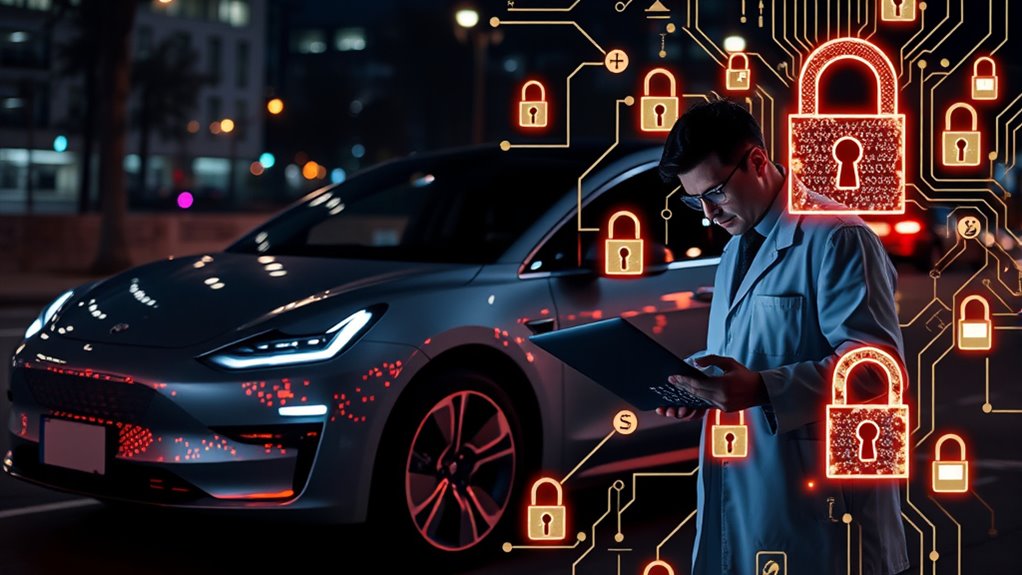Car hacking is a serious concern for connected vehicles. To secure your vehicle, make sure you regularly update the firmware, as manufacturers often release patches for security flaws. Avoid public Wi-Fi and unsecured networks that hackers can exploit. Use secure connections and consider enabling two-factor authentication for added protection. Being proactive about your vehicle’s security can help prevent unauthorized access. Keep exploring to find more tips and strategies to protect your vehicle from potential cyber threats.
Key Takeaways
- Regularly update your vehicle’s firmware to patch security flaws and enhance protection against potential hacking incidents.
- Avoid connecting to public Wi-Fi networks, as they can be exploited by hackers to gain unauthorized access to vehicle systems.
- Utilize secure, trusted networks for vehicle connections to minimize the risk of cyber threats and unauthorized control.
- Enable two-factor authentication for connected vehicle services to add an extra layer of security against unauthorized access.
- Stay informed about potential wireless vulnerabilities and practice regular security measures to protect your connected vehicle.

Have you ever wondered how vulnerable your car might be to hacking? As vehicles become increasingly connected, the potential for cyberattacks grows. You might think your car is just a mode of transportation, but in reality, it’s a sophisticated piece of technology, often equipped with wireless capabilities that can expose it to various threats. Wireless vulnerabilities are a significant concern, as hackers can exploit them to gain unauthorized access to your vehicle’s systems.
Imagine driving down the highway, blissfully unaware that someone could be manipulating your car’s functions from miles away. Hackers can exploit these wireless vulnerabilities to unlock doors, start the engine, or even disable brakes. This isn’t just a theoretical issue; there have been real instances where hackers took control of vehicles, demonstrating how vital it is to understand the risks involved.
Imagine someone manipulating your car from afar, exploiting vulnerabilities to unlock doors or disable brakes—this risk is very real.
One of the best ways to protect your car from potential hacking is to stay up to date with firmware updates. Automakers regularly release these updates to patch security holes and improve overall vehicle performance. By neglecting these updates, you’re practically leaving your car’s systems exposed to vulnerabilities that hackers are eager to exploit. So, make it a habit to check for firmware updates for your vehicle regularly. It’s a simple step that can go a long way in protecting you and your passengers.
You should also be cautious about the networks your car connects to. Many modern vehicles come with built-in Wi-Fi or the ability to connect to your smartphone. Confirm you’re using secure networks and avoid public Wi-Fi whenever possible. Hackers often set up fake networks to lure unsuspecting users, and if you connect your car to one, you’re putting yourself at risk.
Additionally, consider employing security features like two-factor authentication, if available, for any connected services your vehicle may offer. This extra layer of security can help prevent unauthorized access, providing you with peace of mind. Furthermore, understanding the importance of trust issues with boyfriend no-shows can be a reminder that just as trust is foundational in relationships, it is equally crucial in securing your vehicle against potential threats.
Frequently Asked Questions
What Are the Signs That My Car Has Been Hacked?
If your car’s acting strangely, it might be hacked. Look for signs like unusual behavior in vehicle diagnostics, such as warning lights that appear without reason. You might notice unauthorized access attempts, like changes to your settings or unresponsive features. If your GPS suddenly reroutes or you find unfamiliar apps installed, those are red flags too. Stay alert, and if you suspect something’s wrong, have a professional check it out immediately.
Can Car Hacking Void My Vehicle’s Warranty?
Yes, car hacking can void your vehicle’s warranty. Manufacturers often have strict policies regarding unauthorized modifications or tampering, which includes hacking. If you’ve modified the firmware or software to bypass security measures, it might lead to warranty claims being denied. Always check your manufacturer’s policies on firmware updates and hacking to avoid unexpected costs. Staying informed helps you maintain your warranty and keeps your vehicle secure.
How Do I Report a Suspected Car Hacking Incident?
To report a suspected car hacking incident, start by documenting all details, including times, locations, and any unusual behavior. Contact your vehicle manufacturer immediately to follow their reporting procedures. You should also notify local law enforcement to guarantee it’s officially recorded. Keep in mind any legal considerations, as certain data might be sensitive. Finally, consider contacting cybersecurity experts who can provide further assistance in securing your vehicle against future incidents.
Are Certain Car Models More Susceptible to Hacking?
Yes, certain car models are more susceptible to hacking due to their vehicle vulnerability. Manufacturers may prioritize features over security, leaving gaps that hackers can exploit. Models with outdated software or limited cybersecurity measures are particularly at risk. You should research specific models and their security ratings before making a purchase. Staying informed about your vehicle’s security updates can help mitigate risks and protect against potential hacking incidents.
What Personal Data Can Hackers Access Through My Vehicle?
Hackers can access various personal data through your vehicle, including GPS location, contact lists, and even driving habits. These vehicle data breaches pose significant driver privacy risks, as they might expose sensitive information like your home address or frequent destinations. If your car’s systems are connected to the internet or paired with your smartphone, it increases the chances of unauthorized access. Staying informed about your vehicle’s security features is essential to protect your data.
Conclusion
As you drive down the road, a sudden thought strikes you: your connected car is both a marvel and a target. Just like a key in a lock, security measures can either keep intruders out or invite them in. By staying informed and proactive, you’re not just protecting your vehicle; you’re safeguarding your journey. Coincidentally, each mile you travel is a reminder that in this digital age, vigilance is your best defense against the unseen threats lurking in the shadows.









